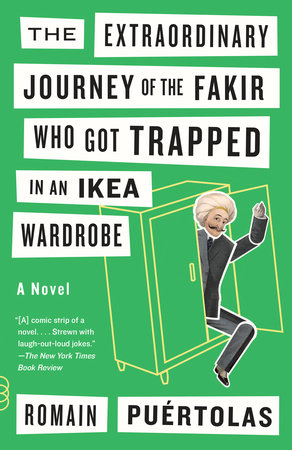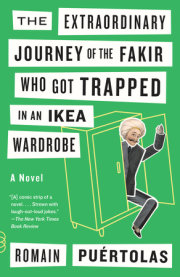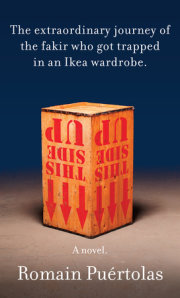A fakir by trade, Ajatashatru Oghash (pronounced Ajarofratstewohgosh!) had decided to travel incognito for his first trip to Europe. For this occasion, he had swapped his “uniform,” which consisted of a loincloth shaped like an enormous diaper, for a shiny gray suit and a tie rented for peanuts from Dilawar (pronounced Die, lawyer!), an old man from the village who had, during his youth, been a representative for a famous brand of shampoo, and who still had an impressive head of (graying) hair.
In choosing this disguise, which he was to wear for both days of his trip, the fakir had secretly wished to be taken for a wealthy Indian industrialist—so much so that he had forsaken wearing comfortable clothes (i.e., a tracksuit and sandals) for the three-hour bus journey and a flight lasting eight hours and fifteen minutes. After all, pretending to be something he was not was his job: he was a fakir. He had kept only his turban, for religious reasons. Beneath it, his hair kept growing and growing. It was now, he estimated, about sixteen inches long, with a total population of thirty thousand (mostly germs and fleas).
Getting into the taxi that day, Ajatashatru (pronounced Acatinabatsuit) had immediately noticed that his peculiar get-up had produced the desired effect on the European, in spite of the tie, which neither he nor his cousin knew how to knot correctly, even after the perfectly clear but somewhat shaky explanations of Dilawar, who had Parkinson’s. But obviously this was a minor detail, as it had gone unnoticed amid the overwhelming elegance of his attire.
A glance in the rearview mirror not being enough to contemplate such handsomeness, the Frenchman had actually turned around in his seat in order to better admire Ajatashatru, making the bones in his neck crack as he did so, as if he were preparing for an act of contortionism.
“Ikea?”
“Ikeaaa.”
“Lequel? Er . . . what Ikea?” the driver had
stammered, apparently as comfortable speaking English as a (holy) cow on ice skates.
“Just Ikea. Doesn’t matter. The one that best suits you. You’re the Parisian.”
Smiling, the driver had rubbed his hands before starting the engine.
The Frenchman has taken the bait, thought Ajatashatru (pronounced Ajackalthatateyou) with satisfaction. This new look was proving ideal for his mission. With a little luck, and if he didn’t have to open his mouth too much, he might even pass for a native.
Ajatashatru was famous throughout Rajasthan for swallowing retractable swords, eating broken glass made from zero-calorie sugar, stabbing his arms with fake needles, and a heap of other conjuring tricks, the secrets of which were known only to him and his cousins, and which he was happy to label magical powers in order to bewitch the masses.
So, when the time came to pay the bill for the taxi ride, which amounted to €98.45, our fakir handed over the only money he had for his entire trip—a counterfeit €100 note printed on just one side—while nonchalantly gesturing to the driver that he could keep the change.
Just as the driver was sliding the note into his wallet, Ajatashatru created a diversion by pointing at the huge yellow letters that proudly spelled out IKEA above the blue building. The gypsy looked up long enough for the fakir to pull nimbly on the invisible elastic that connected his little finger to the €100 note. A tenth of a second later, the money had returned to its original owner.
“Oh, I almost forgot,” said the driver, believing the note to be nestled safely within his wallet. “Let me give you my firm’s card. In case you need a taxi for the way back. We have vans as well, if you need. Believe me, even in flatpack form, furniture takes up a lot of space.”
Gustave never knew if the Indian had under- stood any of what he had just told him. Rummaging in the glove compartment, he pulled out a laminated business card emblazoned with a flamenco dancer and handed it to him.
“Merci,” said the foreigner.
When the red Mercedes of Gypsy Taxis had disappeared—although the fakir, who was only used to making small-eared Indian elephants disappear, could not claim to be responsible—Ajatashatru slipped the card into his pocket and contemplated the vast commercial warehouse that stretched out in front of him.
Copyright © 2015 by Romain Puertolas. All rights reserved. No part of this excerpt may be reproduced or reprinted without permission in writing from the publisher.


































































































